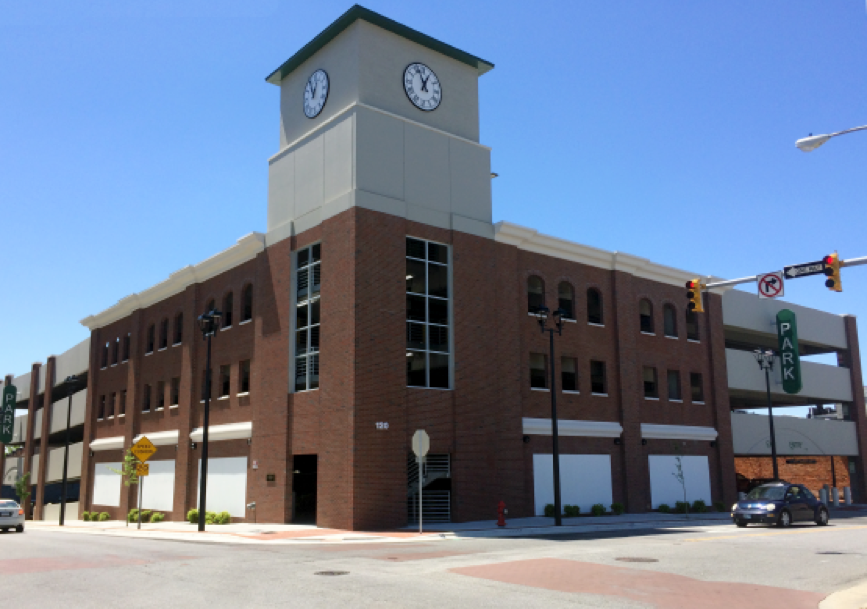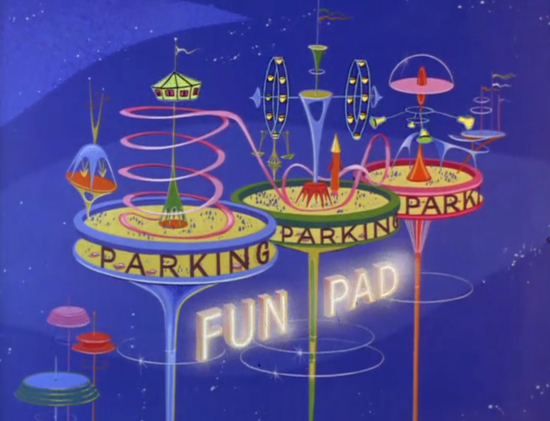|
|
Student Corner: The Future of Parking DecksBy CED Program Interns & StudentsPublished June 9, 2016
Parking decks can be unattractive, costly to build and operate, and tied down to potentially valuable downtown land that might not even be taxed. The US Census estimates that there are 105 million parking spots in the US; however, other estimates bring that number to 750 million! Even with alternative transportation options, the car still rules which means parking decks will continue to take up valuable downtown space in the foreseeable future. However, what happens when that foreseeable future is actually all not that distant, when cars no longer are the popular transportation option? What happens to those massive concrete parking decks? Depending on the design and material choices, parking decks will fall apart or become underutilized.  Local governments and developers spend millions of dollars on constructing parking decks. However, maybe a case could be made to actually spend more on top of that to ensure the garages remain intact for many decades to come. Rather than thinking of a parking deck as a necessary evil, consider the fact that a parking deck, if designed with sustainability in mind, could be repurposed to generate additional tax revenue. Plus, local governments could save on demolition or repair costs if the structure was designed to be repurposed. In a ULI article on sustainability and parking decks, Will Macht, a professor of urban planning at Portland State University, discusses how parking decks can be flexibly designed so that when parking is no longer the highest-and-best use, the parking deck is readily converted into another use. For example, the Massachusetts Port Authority is currently designing a $90 million, 1,500 space deck for the South Boston Waterfront. Rather than designing it just as a garage, it will also serve as a home for Zipcar vehicles, Hubway bikes, and shuttles. In addition, there will be room for people to walk around and provide people information about the area. Their goal is to design a deck that will contribute to the downtown rather than just serving the downtown. Rather than engineering a deck to minimize cost, local governments could consider adding design elements that will allow for redevelopment in the future. Local governments, when considering the financing of a deck, should be attuned to several key elements in the table below. If a parking deck is valued only at will it cost to build and boosts in sales taxes, then perhaps local governments should also factor the income value that a repurposed deck could generate following the useful life of the deck. Considering that decks are necessary to spur additional development and meet the demand for parking, why not design the deck with the future in mind even if it means spending more now? While not all decks can look like these, incorporating some design and structural elements above could boost their redevelopment potential in the future. Omar Kashef is a third-year graduate student seeking a dual-degree in Public Administration and Information Science and is currently a Fellow with the Development Finance Initiative. |
Published June 9, 2016 By CED Program Interns & Students
 Could you imagine living in a 135 square foot apartment? Well, a dozen students at the Savannah College of Art and Design did just that. Along with alumni and professors, the students turned a class project into reality. Through a special use permit, students temporarily lived in these micro-units in an underutilized parking deck in Atlanta. While not a full repurposing of a parking deck, the SCADpad is one take on how to repurpose decks in the future.
Could you imagine living in a 135 square foot apartment? Well, a dozen students at the Savannah College of Art and Design did just that. Along with alumni and professors, the students turned a class project into reality. Through a special use permit, students temporarily lived in these micro-units in an underutilized parking deck in Atlanta. While not a full repurposing of a parking deck, the SCADpad is one take on how to repurpose decks in the future.
Parking decks can be unattractive, costly to build and operate, and tied down to potentially valuable downtown land that might not even be taxed. The US Census estimates that there are 105 million parking spots in the US; however, other estimates bring that number to 750 million! Even with alternative transportation options, the car still rules which means parking decks will continue to take up valuable downtown space in the foreseeable future. However, what happens when that foreseeable future is actually all not that distant, when cars no longer are the popular transportation option? What happens to those massive concrete parking decks? Depending on the design and material choices, parking decks will fall apart or become underutilized.

Local governments and developers spend millions of dollars on constructing parking decks. However, maybe a case could be made to actually spend more on top of that to ensure the garages remain intact for many decades to come. Rather than thinking of a parking deck as a necessary evil, consider the fact that a parking deck, if designed with sustainability in mind, could be repurposed to generate additional tax revenue. Plus, local governments could save on demolition or repair costs if the structure was designed to be repurposed.
In a ULI article on sustainability and parking decks, Will Macht, a professor of urban planning at Portland State University, discusses how parking decks can be flexibly designed so that when parking is no longer the highest-and-best use, the parking deck is readily converted into another use. For example, the Massachusetts Port Authority is currently designing a $90 million, 1,500 space deck for the South Boston Waterfront. Rather than designing it just as a garage, it will also serve as a home for Zipcar vehicles, Hubway bikes, and shuttles. In addition, there will be room for people to walk around and provide people information about the area. Their goal is to design a deck that will contribute to the downtown rather than just serving the downtown.
Rather than engineering a deck to minimize cost, local governments could consider adding design elements that will allow for redevelopment in the future. Local governments, when considering the financing of a deck, should be attuned to several key elements in the table below.
If a parking deck is valued only at will it cost to build and boosts in sales taxes, then perhaps local governments should also factor the income value that a repurposed deck could generate following the useful life of the deck. Considering that decks are necessary to spur additional development and meet the demand for parking, why not design the deck with the future in mind even if it means spending more now? While not all decks can look like these, incorporating some design and structural elements above could boost their redevelopment potential in the future.
Omar Kashef is a third-year graduate student seeking a dual-degree in Public Administration and Information Science and is currently a Fellow with the Development Finance Initiative.
Author(s)
Tagged Under
This blog post is published and posted online by the School of Government to address issues of interest to government officials. This blog post is for educational and informational Copyright ©️ 2009 to present School of Government at the University of North Carolina. All rights reserved. use and may be used for those purposes without permission by providing acknowledgment of its source. Use of this blog post for commercial purposes is prohibited. To browse a complete catalog of School of Government publications, please visit the School’s website at www.sog.unc.edu or contact the Bookstore, School of Government, CB# 3330 Knapp-Sanders Building, UNC Chapel Hill, Chapel Hill, NC 27599-3330; e-mail sales@sog.unc.edu; telephone 919.966.4119; or fax 919.962.2707.


